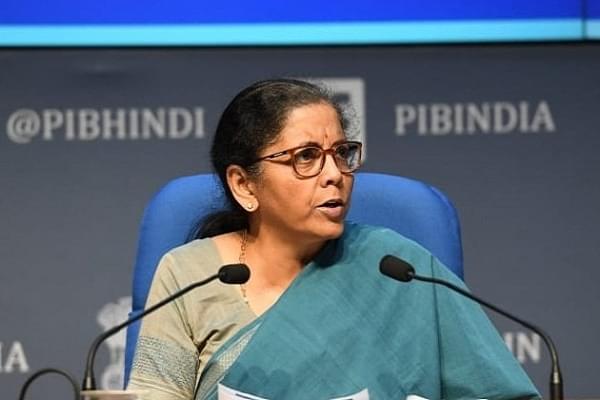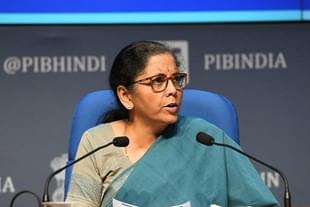News Brief
Perception Battles, Feedback Loops: What FM Nirmala Sitharaman's Recent Comments Tell Us About The Still-Evolving GST Regime
Swarajya Staff
Feb 23, 2022, 01:15 PM | Updated 01:15 PM IST
Save & read from anywhere!
Bookmark stories for easy access on any device or the Swarajya app.


On 21 February, Union Finance Minister Nirmala Sitharaman participated in a post-Budget interaction session in Mumbai and sought a more nuanced debate on Goods and Services Tax (GST) reforms. She urged the industry leaders to be more vocal about the reforms.
The rollback of GST rate “corrections” on textiles in late December will hurt the production-linked incentives (PLI) scheme for the sector, the Finance Minister was quoted as saying by The Hindu.
In response to Grasim Industries managing director M K Agarwal's complain about the inverted GST rate structure for the textiles- with basic raw material taxed at 18 per cent and the later parts of the value chain taxed at lower rates- Sitharaman said:
“That is exactly what we wanted to correct, the inversion that is hurting all of us. It was a conscious decision taken by the GST Council after having deliberated over three meetings. But then we had to wait for longer and said all right, we will give more time to correct it and retain the status quo.”
The Finance Minister also said that the industry had given mixed signals on the rate changes approved by the GST Council for textiles in September 2021.
“The voice of the industry is also sometimes, this way, some other times, that way. Within the industry, there is a request to correct inversion, but at other times, they say not yet, please bear with us. Therefore, we went to the GST Council and took a call not to correct the inversion at an extraordinary emergency meeting, although the correction itself is required for the PLI. Otherwise investments are not going to come in certain areas,” she said.
Sitharaman also expressed regret at the inability to undertake necessary rate corrections. She said each that decision by the government incorporates ‘a perception battle’, and instead of a passionate knee-jerk reaction to any government steps, the discourse should move to in-depth analysis and discussion. She said that instead of a tendency to oppose decisions without understanding their implications, a more nuanced debate was needed to undertake course correction in the indirect tax regime .
“..the decision taken is not studied in full length before people comment about it and forcefully ask for a retraction. I think all this will have to become a discerning debate over an issue rather than a passionate reaction,” she said.
The Finance Minister also took on Congress leader Rahul Gandhi without taking his name on latter's comment calling the GST "Gabbar Singh Tax". Sitharaman said:
“More often, for whatever reason, knowingly or unknowingly, when we try to tarnish the GST for whatever agenda, we are undermining the institution [GST Council] that has been created with all the States on board. Very knee-jerk reactions like saying ‘Oh My god, GST has now become the Gabbar Singh Tax'…. We are doing a disservice to our own country’s institutions.”
She also said that while there could be "teething problems" when reforms like GST are introduced, overall, they work for the better. She also said that the challenges in the GST had “been taken up over and over again, several iterations are made on the same issue, but the system works”.
Apart from avoiding knee-jerk reactions, Sitharaman also requested the industry leaders to be more "vocal" in the debates concerning the tax regime changes. Revenue Secretary Tarun Bajaj also asked business leaders to be more vocal about the need for reforms.
The Finance Minister pointed out that the reform in the indirect tax regime was not solely the Union government's prerogative. She said that the Centre was in no position to dictate decisions at the GST Council.
“Because you address it to me, doesn’t make it a Central government issue. At the same time, I am not saying it is not a Central government issue. These things need more calibration and discussion,” she said.





